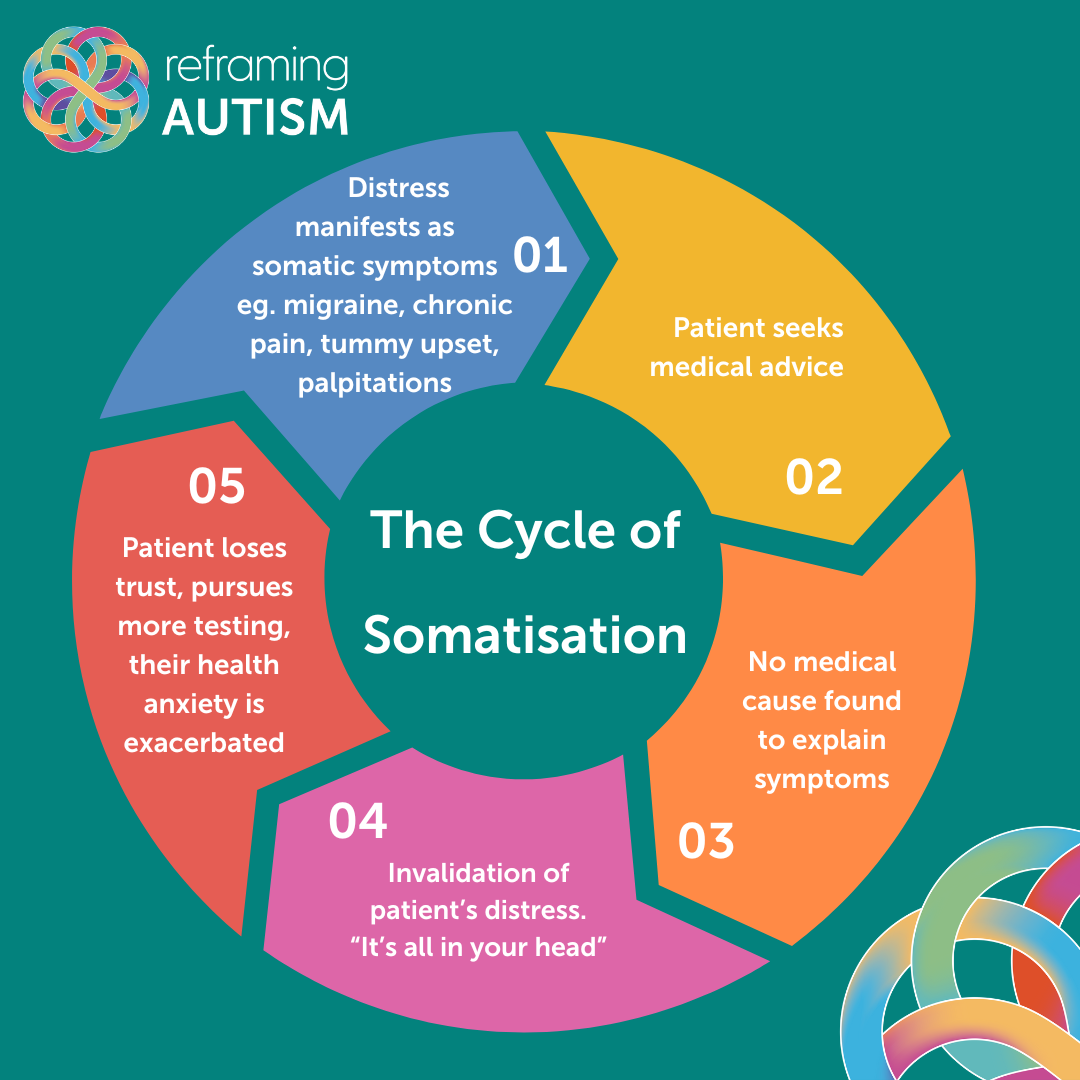
Written by Emma
Content note: health anxiety, medical trauma
But when you are betrayed by your own body, in some respects, it can feel like the ultimate betrayal. It’s the discovery that the one thing you should have left on your side, the one thing that you seemed to have some control over, is also stacked against you.
And so it was revealed to me when I got rushed to the emergency department having lost full sensation in my left arm and the doctors could not find any medical explanation. They said I was not experiencing a true medical emergency, but a symptom of somatisation.
For the person in pain, the bodily sensations are genuinely experienced and not a figment of their imagination. And they do not go away when they’re told they are not rooted in a real physical problem, but a concoction of their mind’s imagining.
The exact causes of somatisation are not fully understood and likely involve a combination of biological, psychological, and social factors. However, several contributing factors have been identified:
Psychological Factors: Somatisation often occurs in individuals experiencing psychological distress, such as anxiety, depression, trauma, or unresolved conflicts. Emotional factors can manifest as physical symptoms when individuals have difficulty expressing or coping with their emotions. For example, someone who experiences high levels of stress or anxiety may develop somatic symptoms as a way of unconsciously expressing or coping with their emotional distress.
Cognitive Factors: Cognitive processes, such as attentional biases and interpretation of bodily sensations, play a role in somatisation. Individuals who are alexithymic, hyper-sensitive to bodily sensations or who interpret them negatively may be more likely to experience somatic symptoms. Additionally, cognitive processes related to illness perception and symptom amplification can contribute to the experience and persistence of somatic symptoms.
Biological Factors: There is evidence to suggest that biological factors, including genetics, neurobiology, and alterations in the stress response system, may contribute to somatisation.
Early Life Experiences: Adverse childhood experiences, such as trauma, neglect, or abuse, have been linked to somatisation later in life.
When you experience somatic symptoms and you have a problem-solving predisposition like I and many Autistic individuals do, your first step is often to get to the root of the problem. Knowledge is power. You focus on seeking medical advice and treatment (as opposed to seeking emotional support which is what you really need). A lack of explanation for the symptoms by health professionals can feel like medical gaslighting, and fuel your health anxiety, putting you on a vicious, self-perpetuating cycle to physical and emotional ruin.
Ironically, effective treatment for somatisation is having a supportive and ongoing doctor-patient relationship together with avoidance of exposure to any treatments or tests that are not needed. As someone who experiences somatisation and feels medically gaslit when my very real symptoms are brushed aside, I lose trust in the doctor-patient relationship and my gut reaction is to seek second opinions and embrace all the treatments and tests that might get to the heart of the very real and frightening symptoms I experience.
My doctor will downplay my symptoms because they do not want to feed into my somatisation. Feeling misunderstood by medical professionals increases my distress and my body expresses this increased distress with new somatic symptomology, which I then go and get testing for …. and round and round the maelstrom I go.

Autistic individuals are statistically more likely to have conditions such as epilepsy, autoimmune disorders, fibromyalgia, depression, bipolar disorder, gastrointestinal disorders, hypermobility, Obsessive Compulsive Disorder, Ehlers Danlos Syndrome and Coeliac disease to name a few – which makes ignoring tummy upsets, migraines and heart palpitations very hard to do!
Among my dramatic list of health conditions, are a brain aneurysm, brain tumours, Crohn’s disease, epilepsy, hypermobility and a hole in my heart (not helped by mitral valve prolapse). How am I supposed to talk myself down if my body is constantly setting off alarm signals of impending death for the very real conditions I have? Do I ignore them at the risk of it being the time the bo(d)y cried, ‘Wolf!’?
Like many things, it is what it is and there is no easy answer. Somatisation is not ‘all in my head’ nor is it ‘resilience building’. It’s a pain in the neck, tummy, head, back … and hip pocket once the medical bills come in. To all those navigating the torturous cycle of somatisation, I hope you can take comfort in the fact you are not alone. It’s little comfort, I know, but when you’re somatically challenged you’ve got to take what little comfort you can get.
References
Carpita B, Nardi B, Tognini V, Poli F, Amatori G, Cremone IM, Pini S, Dell’Osso L. (2024) Autistic Traits and Somatic Symptom Disorders: What Is the Link? Brain Sciences. 2024; 14(3):274. https://doi.org/10.3390/brainsci14030274

The Reframing Autism team would like to acknowledge the Traditional Owners of the lands on which we have the privilege to learn, work, and grow. Whilst we gather on many different parts of this Country, the RA team walk on the land of the Awabakal, Birpai, Whadjak, and Wiradjuri peoples.
We are committed to honouring the rich culture of the Aboriginal and Torres Strait Islander peoples of this Country, and the diversity and learning opportunities with which they provide us. We extend our gratitude and respect to all Aboriginal and Torres Strait Islander peoples, and to all Elders past and present, for their wisdom, their resilience, and for helping this Country to heal.